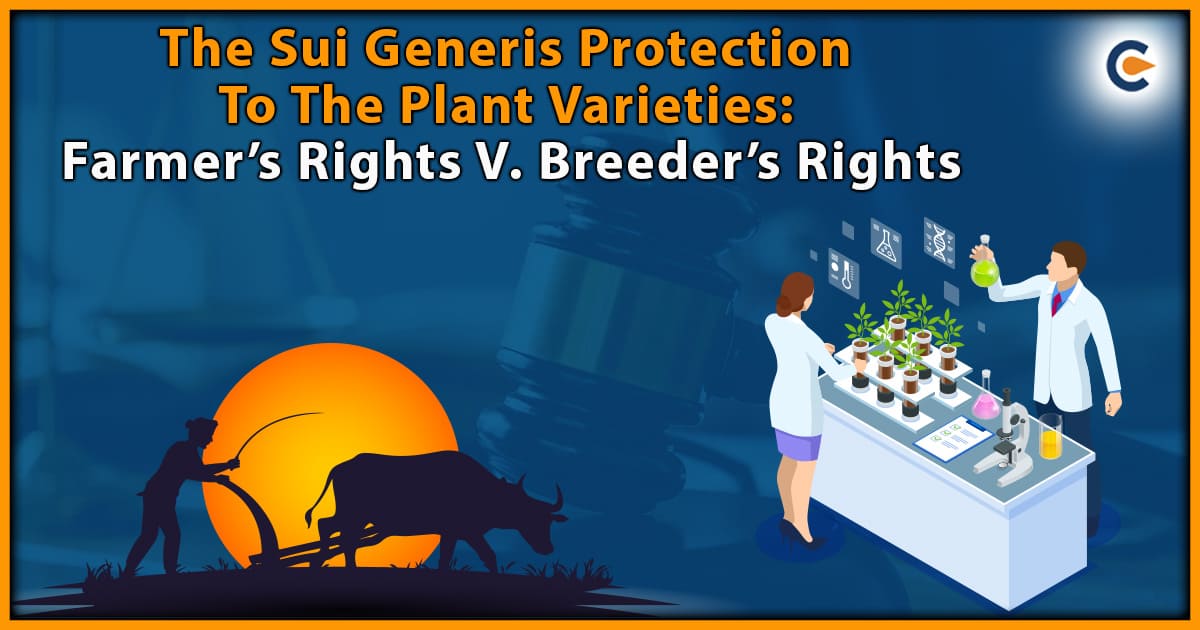Due to the substantial changes in legislation and policy over the past few decades, the agriculture business is one of the most important sectors to comprehend and analyze the context of intellectual property rights.
Plant variety management includes preserving, using, and exploiting plant varieties by farmers, commercial breeders, governments, and international organizations. Within the larger field of intellectual property, there is a specific focus on plant variety protection, which concerns only information that has commercial value. This type of protection grants exclusive commercial rights to owners of plant varieties for a defined period and is referred to as “plant variety protection.”
Rapid alterations to the global system managing genetic resources are significantly impacting the framework of agricultural development in developing nations. An essential aspect of this change involves the responsibility of WTO member countries to expand intellectual property protection in agriculture, which includes safeguarding improved plant varieties with a robust sui generis protection system. This would be in addition to the protection already provided by the Convention on Biological Diversity (CBD) and the International Treaty on Plant Genetic Resources for Food and Agriculture (ITPGR). This is just one of many requirements of the Agreement on Trade-Related Aspects of Intellectual Property Rights (TRIPS), significantly impacting how many developing nations protect their intellectual property.
Sui Generis Protection of Plant Varieties
Sui generis protection of plant varieties is a legal framework that grants intellectual property rights to plant breeders for new varieties of plants they have created. The term “sui generis” means “unique” or “of its kind” and refers to the fact that this system is distinct from traditional forms of intellectual property protection, such as patents or trademarks.
A sui generis system in India for the adequate protection of plant varieties and the rights of plant breeders and farmers is given under Plant Variety Protection and Farmers Rights Act, 2001. This gives the breeder legal protection to a plant species in the form of Plant Breeder’s Rights, an element of the IPR system, which provides exclusive rights to a registered plant breeder. The sui generis system provides a choice of new intellectual property rights that are not necessarily based on existing rights, such as patents or plant breeder rights.
The concept of sui generis protection gives conceptual justification for developing countries to go beyond traditional IPR categories and protect specific invention categories in accordance with the field’s distinctiveness and the needs of individual countries. It also provides the basis for intellectual property rights integration and sustainable development. Sui generis protection for plant varieties is intended to encourage innovation in plant breeding by providing plant breeders with a means to recoup their investment in research and development and to encourage the development of new and improved plant varieties. At the same time, the system aims to balance the interests of plant breeders with those of farmers and other users of plant genetic resources by providing for certain “farmer’s rights” that allow for the continued use and exchange of plant genetic resources by farmers and other traditional users.
Status Quo
The Protection of Plant Varieties and Farmers’ Rights Act, 2001[1], was passed by India by TRIPS regulations. The Act takes a comprehensive approach to dealing with plant varieties protection and farmers’ rights. As a breeder, inventor, conservationist, etc., it honestly answers the concerns of farmers and advances the idea of farmers’ rights. India has a unique system that is unparalleled worldwide. It has endeavored to blend components of UPOV and ITPGRFA with certain distinctive aspects of its own to fulfill the needs of farmers.
According to Section 39 of the PPV&FR Act of India, farmers have several rights. The definitions of farmers and the extent of legal protection provided for their rights in other Asian countries can be compared to those in India.
The Act outlines the breeders’ and farmers’ rights in specific detail. The protected variety may only be produced, sold, marketed, distributed, imported, or exported by the breeders. In infringement cases, they may appoint an agent or licensee and use their civil remedies.
On the other hand, farmers who have created novel plant varieties have the same rights to registration and protection that the variety’s breeder has. For preserving landraces and wild relatives of commercial plants, they are also entitled to recognition and incentives.
On the international front, most of the international IPR obligations are adopted in the UPOV Act.
The law defines the requirements for eligibility, the scope of exclusive rights, the principle of national treatment, the duration of protection, and the exceptions and limitations to exclusive rights.
Article 58 of the 1978 Act provides; that any person who engages in:
- Production for commercial marketing
- The offering of sale
- Marketing concerning a protected variety’s reproductive or vegetative propagating material must obtain prior authorization from the breeder.
Farmer’s Rights
The PPV&FR Act aims to provide equal recognition and protection to plant breeders and farmers. It acknowledges farmers’ critical contributions to conserving, improving and providing Plant Genetic Resources (PGR) for the development of new plant varieties.
The Act acknowledges that farmers play multiple roles in cultivating, conserving, developing and selecting varieties. Regarding variety development and selection, the Act recognizes the value farmers add to wild species or traditional varieties/landraces through selection and identification of economic traits. Therefore, farmers’ rights include user, conservers, and breeder roles.
Farmers are granted nine specific rights, which are as under:
- Access To Seed [Section 39(1)(Iv)]
Farmers have the right to save, utilize, plant, replant, trade, distribute, or market their farm products, including the seed of safeguarded varieties, just as they had the right to do before implementing the PPV&FR Act. Nonetheless, they are not permitted to market trademarked seeds of a variety safeguarded under this Act. They are allowed to use seeds saved from a crop grown on their land.
- Benefit Sharing [Section 26]
Individuals and groups who offer Plant Genetic Resources (PGR) to breeders to develop new plant varieties are entitled to receive a fair share of profits from the commercial sale of the registered varieties. The PPV&FR Act, enacted in 2001, is the first national plant variety protection law to include access and benefit-sharing (ABS) and Plant Breeder’s Rights (PBRs) provision. While the Biological Diversity Act of 2002 allows access to genetic resources used in breeding, the PPV&FR Act mandates breeders to make a sworn statement regarding the geographic origin of the genetic resources used in the ancestry of the new plant variety and its accession.
- Compensation [Section 39(2)]
Seed registered must be sold with complete information about its agricultural performance under recommended management conditions. If such seed is sold to farmers but doesn’t provide the expected performance under recommended management conditions, the farmer can seek compensation from the breeder with the help of the PPV&FR Authority.
- Reasonable Seed Price [Section 47]
Farmers are entitled to obtain seeds of registered varieties at a fair price. If this requirement is not met, the breeder’s exclusive rights to the variety are put on hold, and the breeder must allow a competent legal entity to produce, distribute, and sell the seed. Many plant variety protection laws have clauses on compulsory licensing to guarantee that farmers can access sufficient seed. Some of these laws also consider unjust pricing as a justification for compulsory licensing.
- Farmers’ Recognition And Reward For Contributing To Conservation [Section 39(I)(Iii) & Section 45(2)(C)]
Farmers who have been involved in preserving and enhancing plant genetic resources (PGR) and who have made significant contributions in supplying genetic resources for crop improvement receive acknowledgment and compensation from the national gene fund. The gene fund receives resources from the implementation of the Act, as well as from national and international organizations. The funds support the preservation and sustainable use of PGR, making it comparable to the global benefit-sharing fund of the International Treaty on Plant Genetic Resources for Food and Agriculture.
- Registration Of Farmers’ Varieties [Section 39(1)(Iii)]
Under the PPV&FR Act, farmers are permitted to register their existing varieties if they meet the conditions of being distinct, uniform, stable, and named, but not if they are new. This registration right is only available for a specific time frame. It is a one-time opportunity that begins when a crop species is added to the PPV&FR Act’s list of crops eligible for registration. Once a farmer’s variety is registered, they are granted all Plant Breeder’s Rights.
- Prior Authorization For The Commercialization Of Essentially Derived Varieties [Section 28 (6)]
For a third party to use farmers’ existing or new varieties as the basis for creating an essentially derived variety, they must first obtain authorization from the farmers. This process allows farmers to negotiate terms with the breeder, including royalties, benefit-sharing, or other conditions for commercialization.
- Exemption From Registration Fees For Farmers [Section 44]
According to the PPV&FR Act, farmers are granted the benefit of not having to pay any fees or other charges typically required for variety registration, as well as for services rendered by the PPV&FR Authority, such as tests for distinctness, uniformity, and stability (DUS), and legal proceedings related to infringement or other causes in courts or tribunals.
- Farmer Protection From Innocent Infringement [Section 42]
This provision is included in recognition of the traditional unrestricted rights farmers have held over the seed of all varieties for centuries. The PPV&FR Act is a new concept, and many farmers may not have a good understanding of the legal aspects of it. If a farmer is accused of infringing on any rights specified in the PPV&FR Act and can demonstrate to the court that they were unaware of such rights at the time of the infringement, they will not be held liable.
Breeders’ Rights
The Protection of Plant Varieties and Farmers’ Rights (PPV&FR) Act, 2001, is an Indian law that protects new plant varieties and the rights of farmers who have traditionally conserved and developed these varieties. The law recognizes and grants breeders’ rights to plant breeders for new and distinct varieties of plants they have created.
The breeder has exclusive rights to produce, distribute, sell, import, or export the protected variety. The breeder can also appoint an agent or licensee and have the right to take legal action for violating their rights.
Section 28(1) is a crucial provision that helps protect the breeder’s interests and encourages innovation in plant breeding by providing a legal framework for enforcing plant variety protection.
Section 28(1) of The Protection of Plant Varieties and Farmers’ Rights (PPV&FR) Act, 2001, is a necessary provision granting breeders the right to enforce their breeder’s rights against anyone who infringes on those rights. This provision is critical to ensure that the breeder’s investment in developing a new plant variety is protected and others do not misappropriate the fruits of their labor.
Under this provision, breeders can initiate legal proceedings against anyone who infringes on their breeder’s rights by using their registered plant variety without their permission. Such infringements may include unauthorized production, sale, marketing, distribution, import, or export of the registered plant variety.
Breeders have the right to claim remedies such as injunctions, damages, and accounts of profits from any person who infringes on their breeder’s rights. An injunction is a court order restraining the infringer from continuing the infringing activity. Damages refer to the compensation that the breeder is entitled to for the losses suffered due to the infringement, and the account of profits refers to the profits earned by the infringer due to the infringement.
Conclusion
India has taken a courageous step by adopting the sui generis method to fulfill its TRIPS commitment to provide intellectual property protection for plant varieties. It has used the flexibilities available under Article 27.3(b) and created a mechanism to safeguard farmers’ rights. Breeders’ and farmers’ rights are two distinct rights related to plant varieties, with different ownership, scope, purpose, and restrictions. While breeder rights aim to incentivize plant breeding, farmers’ rights protect the interests of traditional farmers who have conserved and used plant varieties over generations. Any alternative approach violated India’s legal commitment under the International Treaty on Plant Genetic Resources and Farmer’s Rights of 2001, which became effective in 2004.
Read Our Article: What Are Plant Patents? – Protecting Innovation In The Agriculture Industry











